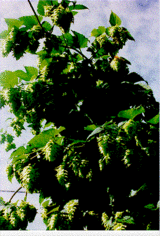Hop: Difference between revisions
Uncle Jesse (talk | contribs) (Converting hop* pages to hop. Hops, hopped, hopping etc.) |
Uncle Jesse (talk | contribs) No edit summary |
||
| (One intermediate revision by the same user not shown) | |||
| Line 5: | Line 5: | ||
Hop acids have a mild antibiotic effect against Gram-positive bacteria which favors the exclusive activity of brewing [[Yeast|yeast]] in the [[Fermentation|fermentation]] of beer. The flavor imparted by hops varies greatly by variety and use: hops boiled with the beer ("bittering hops") produce a bitterness while hops added to beer later impart some degree of "hop flavor" (final 10 minutes of boil) and "hop aroma" (final 3 minutes, or less of boil) and a lesser degree of bitterness. Adding hops after the boil, a process known as "dry hopping", adds very little bitterness. The degree of bitterness imparted by hops depends on the degree to which otherwise insoluble alpha acids (AAs) are isomerized during the boil. Unboiled hops are only mildly bitter. The bitterness impact of a given amount of hops is specified in [[International_Bitterness_Units|International Bittering Units]] ([[IBU]]). | Hop acids have a mild antibiotic effect against Gram-positive bacteria which favors the exclusive activity of brewing [[Yeast|yeast]] in the [[Fermentation|fermentation]] of beer. The flavor imparted by hops varies greatly by variety and use: hops boiled with the beer ("bittering hops") produce a bitterness while hops added to beer later impart some degree of "hop flavor" (final 10 minutes of boil) and "hop aroma" (final 3 minutes, or less of boil) and a lesser degree of bitterness. Adding hops after the boil, a process known as "dry hopping", adds very little bitterness. The degree of bitterness imparted by hops depends on the degree to which otherwise insoluble alpha acids (AAs) are isomerized during the boil. Unboiled hops are only mildly bitter. The bitterness impact of a given amount of hops is specified in [[International_Bitterness_Units|International Bittering Units]] ([[IBU]]). | ||
Latest revision as of 21:58, 15 December 2022
Hops are the female flowers of the Humulus lupulus, or hop, vine used as a flavor and stability agent in beer. The hop plant is technically a bine; unlike a vine which uses tendrils, suckers, and other appendages to aid in climbing, bines have stout stems with stiff hairs to climb.
The hop plant grows from a cold-hardy perennial rhizome. Shoots emerge in early spring with the first spring flowers. Hop shoots grow very rapidly and at the peak of growth can grow upwards of a foot (300 mm) a week. Hop bines climb by wrapping clockwise around anything within reach. Typically individual bines grow between 18 and 30 feet (5.5 to 9 metres) depending on what is available to grow on. When the hop bines run out of material to climb horizontal shoots grow from between the leaves of the main stem and the stem.
Hop acids have a mild antibiotic effect against Gram-positive bacteria which favors the exclusive activity of brewing yeast in the fermentation of beer. The flavor imparted by hops varies greatly by variety and use: hops boiled with the beer ("bittering hops") produce a bitterness while hops added to beer later impart some degree of "hop flavor" (final 10 minutes of boil) and "hop aroma" (final 3 minutes, or less of boil) and a lesser degree of bitterness. Adding hops after the boil, a process known as "dry hopping", adds very little bitterness. The degree of bitterness imparted by hops depends on the degree to which otherwise insoluble alpha acids (AAs) are isomerized during the boil. Unboiled hops are only mildly bitter. The bitterness impact of a given amount of hops is specified in International Bittering Units (IBU).
